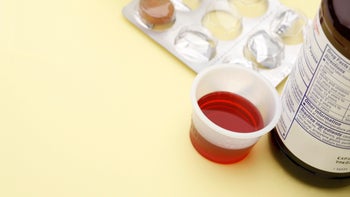
8 DayQuil Side Effects You Should Know About
Key takeaways:
DayQuil is a line of over-the-counter (OTC) medications that treat cold and flu symptoms. Most DayQuil products contain some combination of acetaminophen (pain reliever), dextromethorphan (cough suppressant), and phenylephrine (decongestant).
Most people can take DayQuil without experiencing problems. Some people occasionally report side effects such as dizziness, nausea, and upset stomach. Serious side effects, such as liver damage and serotonin syndrome, are rare.
It’s important to take DayQuil as directed. Also try to be mindful of its active ingredients — especially if you’re taking other medications that serve a similar purpose. It’s easy to accidentally take multiple OTC products that contain the same ingredient.
Access savings on related medications
Table of contents

Most people experience cold or flu symptoms at some point. When they develop, it’s only natural to seek relief. Over-the-counter (OTC) medications, such as DayQuil, are popular ways to manage these symptoms on your own.
DayQuil helps lessen several cold- and flu-related symptoms. The brand name “DayQuil” refers to an entire line of products; many versions of DayQuil are available. The most common DayQuil ingredients include acetaminophen (pain reliever), dextromethorphan (cough suppressant), and phenylephrine (decongestant). These ingredients work together to ease symptoms such as fever, cough, and nasal congestion, helping you feel better while you’re under the weather.
DayQuil is meant for short-term relief to help you get through your day. It’s also less likely to make you feel drowsy than medicines like NyQuil, making it a good option for daytime relief. However, like any medication, DayQuil does come with some risks. Understanding how to use it safely is key to making sure it works best for you.
DayQuil side effects at a glance
DayQuil is well tolerated and safe for most people. But it can still cause side effects. Most of these side effects are mild and tend to go away on their own.
Relatively common DayQuil side effects include:
Dizziness or lightheadedness
Feeling nervous
Nausea and vomiting
Upset stomach
Headache
Dry mouth
Although rare, serious side effects can also happen while taking DayQuil, including:
Liver damage
Overdose
Serotonin syndrome
Here, we’ll cover how to manage eight notable DayQuil side effects.
1. Dizziness or lightheadedness
Dizziness, or feeling lightheaded, is a common side effect of DayQuil. You may experience it more intensely if you stand up quickly after sitting or lying down.
Dizziness may occur because of phenylephrine, one of the active ingredients in DayQuil. Phenylephrine helps relieve nasal congestion (stuffy nose) by narrowing your blood vessels. But it can also increase blood pressure slightly, which may cause you to feel dizzy.
If you feel dizzy, try sitting down and resting until the feeling passes. Staying hydrated can also help. If the symptoms continue or feel intense, contact a healthcare professional.
Is it a cold or the flu? Learn the key differences to help you manage your symptoms.
Not all cold and flu medicines work the same: Here’s how to pick the best one based on your symptoms.
Ever wonder why some drugs make you drowsy? Find out which ones have this sleepiness-inducing effect — and why most antibiotics don’t.
2. Feeling nervous
Some people report feeling jittery or anxious after taking DayQuil. This side effect is likely due to phenylephrine. Phenylephrine has similar effects to some stimulants. It can cause comparable side effects as a result, including anxiety. These effects are usually mild and go away on their own, though.
If you notice these symptoms, try taking your next DayQuil dose with food. Food may help quell these symptoms. But if they continue to bother you, consider taking a different cold medication. A pharmacist can recommend another product to try.
3. Nausea and upset stomach
Some people may experience nausea or an upset stomach when taking DayQuil. This is more common if you take the medication on an empty stomach or at higher doses.
To reduce these symptoms, consider taking DayQuil with food or a light snack, such as crackers or toast. Drinking a glass of water before and after taking your dose may also help.
If nausea or stomach discomfort continues or worsens, talk to a healthcare professional. They can determine whether you’re sensitive to one of DayQuil’s ingredients and recommend alternative options. They can also help you figure out if your symptoms are due to your illness itself.
4. Headache
Headaches can sometimes happen while taking DayQuil. They may occur due to dehydration or your body’s response to the medication. What’s causing your symptoms in the first place — a cold or the flu — may also be at fault.
It can be hard to narrow down the specific cause of headaches while taking DayQuil. But treating headaches looks similar regardless. Place a cool cloth or ice pack on your forehead or the back of your neck for relief. Resting in a quiet, dimly lit room can also help — especially if your headache is worsened by light or sound. Make sure to drink enough fluids while taking DayQuil and avoid overuse, which could worsen the headache.
5. Dry mouth
Dry mouth is another potential side effect of DayQuil. It’s generally temporary, but sipping or drinking water throughout the day can help when your mouth feels dry. Chewing sugar-free gum also helps keep your mouth moist. Sucking on ice chips can too.
If this side effect continues to bother you or gets worse, talk to a healthcare professional for more specific advice on how to manage it. Other dry mouth remedies are available, including some prescription medications.
6. Liver damage
Acetaminophen is one of DayQuil’s active ingredients. It’s well tolerated in most cases, but it can be harmful to your liver if taken in higher-than-recommended doses. Taking too much could lead to serious liver damage. Possible symptoms include:
Loss of appetite
Dark-colored urine
Fatigue or feeling unusually tired
Upset stomach or discomfort in your abdomen
Yellowing of your skin or the whites of your eyes (jaundice)
If you notice any of these symptoms, stop taking DayQuil and contact a healthcare professional right away.
Good to know: Many OTC and prescription medications contain acetaminophen. Taking multiple acetaminophen-containing products increases the risk of liver harm. Always check medication labels or talk to your pharmacist if you're unsure if your medicine contains acetaminophen. Also do your best to limit alcohol; alcohol can further harm your liver when combined with acetaminophen.
7. Overdose
Taking more than the recommended dose of DayQuil, or any of the ingredients within DayQuil, could hypothetically lead to an overdose. Understanding the risks associated with each ingredient in DayQuil is essential to stay safe and prevent an emergency.
As mentioned, taking too much acetaminophen may cause liver damage. But another active ingredient in DayQuil is dextromethorphan, which is found in many OTC cold and cough products. It can be misused or accidentally taken in high doses, possibly leading to an overdose. Overdose symptoms can include confusion or hallucination, dizziness or drowsiness, seizures, and loss of consciousness. In many states, you have to be 18 years old to buy dextromethorphan (in effort to prevent misuse).
If you suspect you’ve taken too much DayQuil, call a healthcare professional right away. You can also contact Poison Control online or at 1-800 222-1222. If you’ve developed symptoms that feel severe, it’s better to call 911 or go to the nearest ER.
8. Serotonin syndrome
Serotonin syndrome is a rare condition caused by excess serotonin in the brain. DayQuil may increase the risk of developing serotonin syndrome because it contains dextromethorphan.
Taking DayQuil by itself at recommended doses won’t cause serotonin syndrome. But it may happen if you take DayQuil with other medications that raise serotonin levels. Examples include:
Antidepressants, especially monoamine oxidase inhibitors (MAOIs) like selegiline (Emsam, Zelapar)
Tramadol (ConZip)
Metoclopramide (Reglan, Gimoti)
Antiepileptic medications, like carbamazepine (Tegretol, Equetro) and valproic acid
Cyclobenzaprine (Amrix)
Most cases of serotonin syndrome are mild. They should go away when you stop taking the medication(s) that caused it. However, extreme cases require treatment in the hospital. Mild symptoms of serotonin syndrome can include a fast heart rate, sweating, and trouble sleeping. More severe symptoms include confusion, high fever, and unusual eye movements.
Frequently asked questions
Not typically. However, some people may feel jittery or nervous due to the effects of phenylephrine, which could make it harder to sleep. If you find that you’re sensitive to phenylephrine, it may be better to use an alternative daytime cough and cold product that doesn't contain phenylephrine. Just pay attention to how this medication affects your sleep and adjust your doses accordingly.
DayQuil is also designed to make you feel less drowsy compared to other cold medications, such as NyQuil.
No, DayQuil is generally safe for most people to use when taken as directed. It doesn’t have any known long-lasting effects, either. However, taking too much or using it with certain medications can lead to side effects. Always follow the directions for use on the medication’s packaging and talk to a healthcare professional if you have concerns.
Some individuals may feel "drunk" or lightheaded due to the dextromethorphan component of DayQuil. If you feel unusually dizzy or disoriented, consider stopping the medication and contact a healthcare professional.
The bottom line
DayQuil is a popular over-the-counter (OTC) cold and flu medication. Many DayQuil products are available, but they typically contain a combination of acetaminophen, dextromethorphan, and phenylephrine.
Most DayQuil side effects — such as dizziness, nervousness, or nausea — are mild and go away after you stop taking the medication. However, more serious risks — such as liver damage or serotonin syndrome — can occur too, especially if you take too much or combine it with other medications. Always follow the directions on DayQuil’s labeling and be mindful of other medicines you’re taking. If you experience side effects that feel severe, call 911 or go to the nearest ER immediately.
Why trust our experts?



References
Consumer Healthcare Products Association. (2021). Teen abuse of cough and cold medicines is at a historic low after largest one-year decline in 2021.
Gerriets, V., et al. (2024). Acetaminophen. StatPearls.
National Institute on Drug Abuse. (2017). Over-the-counter medicines DrugFacts.
Richards, E., et al. (2023). Phenylephrine. StatPearls.
Simon, L. V., et al. (2024). Serotonin syndrome. StatPearls.
Talha, B., et al. (2023). Xerostomia. StatPearls.
The Proctor & Gamble Manufacturing Company. (2024). Vicks Dayquil cold and flu- acetaminophen, dextromethorphan hydrobromide, and phenylephrine hydrochloride capsule, liquid filled [package insert]. DailyMed.
Was this page helpful?
Related Articles
Browse medications
View AllResearch prescriptions and over-the-counter medications from A to Z, compare drug prices, and start saving.













